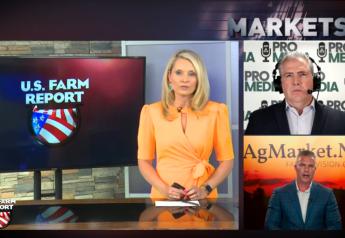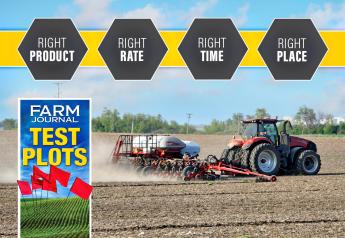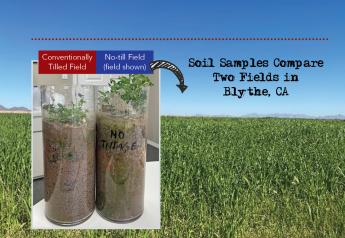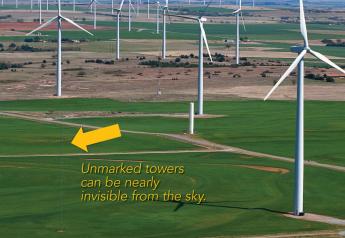Commodity Classic Groups Say Agriculture is the Answer to Addressing Climate
Legislative Priorities 030321
Commodity Classic may be virtual this year, but the groups still have major topics to tackle with the Biden Administration now in the White House. As the core commodity groups iron out their legislative priorities for the new year, the headline is moving from trade to climate.
“This is a big change,” says Tim Lust, CEO of National Sorghum Producers (NSP). “And when we start talking about how we're going to make significant changes in agriculture policy, and how farmers are involved in that. It’s been 25 years since agriculture policy has seen a shift this significant from a policy standpoint. So, it ought to get that amount of respect, it ought to get that amount of review, to make sure that we get it right.”
Corn, sorghum, soybean and wheat growers are all focused on driving climate conversations this year, a key topic during Commodity Classic legislative sessions.
“We need to make sure that we have policy that is a guidepost rather than hitching post,” says Jon Doggett, CEO of National Corn Growers Association (NCGA). Doggett calls the surging interest in climate initiatives corn farmers’ biggest challenge and opportunity.
“Climate change is definitely going to be the conversation that's going to be occurring in Washington, and we're going to be at the table – active participants – to make sure that whatever deal is reached is good for the American corn farmer,” adds Doggett. “The biggest challenge is going to be just that: we are going to make sure corn farmers are getting to the table.”
Securing a Seat at the Table
Securing a seat at the climate conversation table is on the minds of every ag commodity group right now, as agriculture wants to help craft such policies.
“I think that's probably the biggest fear is that policies will try to be crafted by those who don't know agriculture,” says American Soybean Association (ASA) CEO Stephen Censky. “I think that's really the importance of the American Soybean Association, engaging, front and center, and having a seat at the table.
Censky also wants to see climate policy reward those who are already sowing seeds of good stewardship, not just thenew adopters.
“If not, you could end up with some real perverse incentives there. For folks that have been doing good conservation for a lot of years, if they're left out, there's the possibility that people could be tempted to pull tillage equipment out of the grove or out of the shed that they haven't used for years, just to qualify for those payments that might be available,” says Censky.
Different Approach for Different Regions
ASA also wants to see the programs be voluntary, incentive-based, and the programs need to cater to the different challenges growers face in the different geographies across the country.
“A one-size-fits-all approach doesn't work, because we have very different climates, geographies, soil structures. And so what is working in one part of the country may not work in another part of the country,” Censky adds.
Voluntary and incentive-based programs are also a priority of NSP, but it’s the geography piece that Lust says will be key for sorghum.
“Certainly, cover crops are a great discussion for some areas. But for my hometown that has had less than 10 inches of rain in the last year, I’m not sure that that fit is the same,” says Lust. “I think we just have to understand that regional differences are important there.”
Agriculture is the Answer
As the discussions continue to take shape during virtual Commodity Classic this year, and then the commodity associations take those desires to Washington, Censky says agriculture has to remembers its part of the answer when it comes to addressing climate.
“Our soybean farmers believe that agriculture – and soybean farmers themselves – are part of the solution,” says Censky. “Many times in agriculture, agriculture gets blamed. But we really see the good work that soybean farmers have been doing for decades, the continued good work that will be there.”
Returning to ASA from his most recent time at USDA as Deputy Secretary of Agriculture under the Trump Administration, Censky was able to get a firsthand look at all the tools USDA has at its disposal to craft programs within agriculture. Censky says Secretary Tom Vilsack is returning to USDA with eight years of experience, time he thinks will pay off for farmers as the climate conversations continue.
“He knows the kinds of programs that are available, the levers that you can pull, he knows the structure of the Natural Resources Conservation Service (NRCS) and those voluntary incentive-based programs,” says Censky. “I took it as a very good sign that we have Secretary Vilsack andwe have the Biden administration, that have said one of the first things they want to start is the dialogue with farmers. I think that dialogue is key to making sure they understand that they need to talk to agriculture, and they need to come up with solutions that actually work on the ground.”
Related Stories:
NCGA CEO Says Climate Policy Needs to be Guidepost Rather Than Hitching Post







